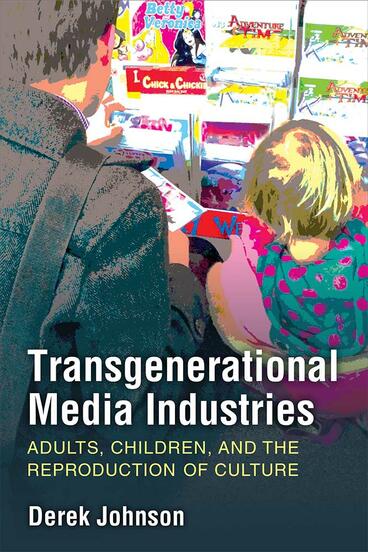Transgenerational Media Industries
Adults, Children, and the Reproduction of Culture
Media industry strategies of production and consumption transform the boundaries between adulthood and childhood while reinforcing social norms, reproductive ideals, and labor hierarchies.
Description
Within corporate media industries, adults produce children’s entertainment. Yet children, presumed to exist outside the professional adult world, make their own contributions to it—creating and posting unboxing videos, for example, that provide content for toy marketers. Many adults, meanwhile, avidly consume entertainment products nominally meant for children. Media industries reincorporate this market-disrupting participation into their strategies, even turning to adult consumers to pass fandom to the next generation.
Derek Johnson presents an innovative perspective that looks beyond the simple category of “kids’ media” to consider how entertainment industry strategies invite producers and consumers alike to cross boundaries between adulthood and childhood, professional and amateur, new media and old. Revealing the social norms, reproductive ideals, and labor hierarchies on which such transformations depend, he identifies the lines of authority and power around which legacy media institutions like television, comics, and toys imagine their futures in a digital age. Johnson proposes that it is not strategies of media production, but of media reproduction, that are most essential in this context. To understand these critical intersections, he investigates transgenerational industry practice in television co-viewing, recruitment of adult comic readers as youth outreach ambassadors, media professionals’ identification with childhood, the branded management of adult fans of LEGO, and the labor of child YouTube video creators. These dynamic relationships may appear to disrupt generational and industry boundaries alike. However, by considering who media industries empower when generating the future in these reproductive terms and who they leave out, Johnson ultimately demonstrates how their strategies reinforce existing power structures.
This book makes vital contributions to media studies in its fresh approach to the intersections of adulthood and childhood, its attention to the relationship between legacy and digital media industries, and its advancement of dialogue between media production and consumption researchers. It will interest scholars in media industry studies and across media studies more broadly, with particular appeal to those concerned about the current and future reach of media industries into our lives.
Derek Johnson is Professor of Media and Cultural Studies in the Department of Communication Arts at the University of Wisconsin–Madison.
Reviews
"Although consumer media appears to attract itself to specific age groups, it is carefully crafted to engage consumers across generations. Johnson carefully interweaves these concepts throughout the book to tell a complex narrative of the many relationships within this space. Whether a parent or a child, readers have the ability to connect with these narratives and reflect on their own upbringing and consumption habits."
- Abigael Semnisky
—Journal of Youth and Adolescence

